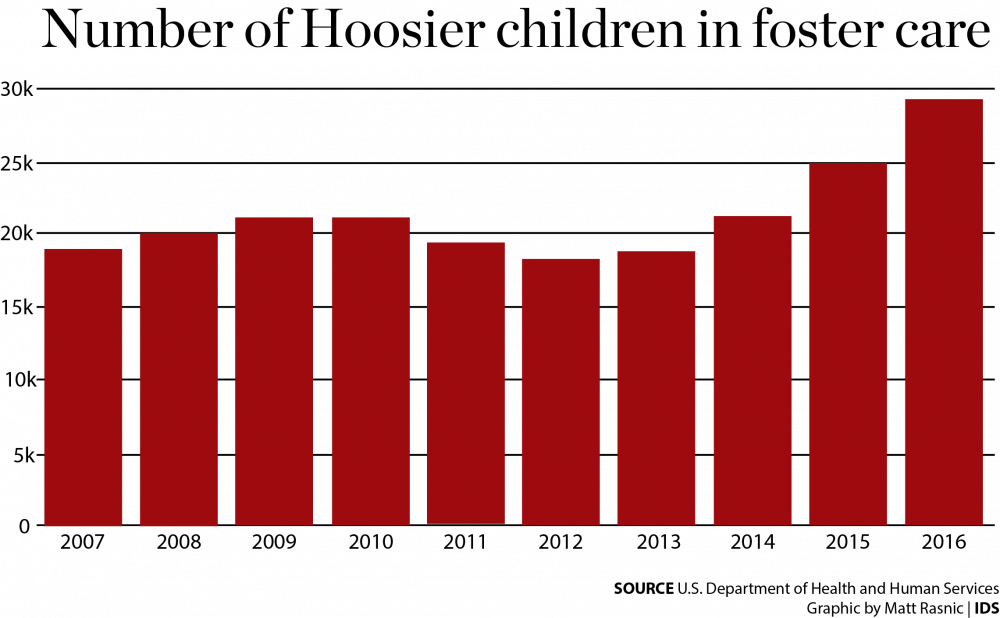Lawmakers worry what the future holds for the Department of Child Services after the former DCS director resigned, saying she felt she was unable to protect children due to cuts in funding for services to children amid the opioid crisis.
When the legislative session started Jan. 3, lawmakers on both sides made it clear that looking into the issues surrounding DCS would be on their agenda, although they disagree on what the approach should be.
Former DCS Director Mary Beth Bonaventura sent her letter of resignation to Gov. Eric Holcomb on Dec. 12.
"Without serious change in the way the governor’s office approaches child welfare and the needs of vulnerable children, I fear lives will be lost and families ruined,” Bonaventura wrote.
In 2016, there were 29,315 children in foster care in Indiana, almost twice as many as any other surrounding state, according to data from the Administration for Children and Families.
After Bonaventura’s resignation, Holcomb hired a new DCS director, Terry Stigdon. He also hired the Child Welfare Policy and Practice Group, a nonprofit organization that focuses on assisting child welfare systems, to conduct an assessment into the accusations made by Bonaventura.
At the first Senate session, President Pro Tempore David Long, R-Fort Wayne, said there are issues surrounding DCS every year.
As he addressed the Senate the first day, Long said that, after the results of the assessment come in, he wants to bring it to the legislative council, a council comprised of eight members of the Senate and eight members of the House of Representatives.
This would bring together people on both sides as well as representatives from the governor’s office to discuss how to end this problem once and for all, Long said.
“It’s not just money,” Long said. “It’s going to have to be organization. It’s going to have to be working better with our caseworkers.”
Long added he does not think the legislature should be holding hearings regarding DCS.
“I don’t think we’re equipped to do that,” Long said. “I don’t think we’re effective in doing that.”
Still, some lawmakers worry if this will be enough. Senate Minority Leader Tim Lanane, D-Anderson, addressed senators at the first session, saying the issue needs to be addressed sooner rather than later.
“If there ever was an issue which presents itself as an emergency matter for consideration in a short session, it is the protection of the children of the state of Indiana,” Lanane said.
Many lawmakers wondered if Holcomb would bring up DCS in Tuesday’s State of the State address and, afterward, had mixed reactions on what he did say.
Holcomb said in his address that he will remain open about the results of the assessment.
“We’ll be transparent and we’ll provide you directly with progress reports,” Holcomb said.
Holcomb also emphasized his continuing support of investigating DCS, saying he will continue to do whatever he can to protect Indiana’s children.
“There is no one that cares more about Hoosier children than I do,” he said.
Many Republicans agree with Holcomb’s current approach, saying they need to wait for the results of the DCS assessment before going further. Some Democrats, however, would like to see work done on DCS this session.
“Our children can’t wait until 2019,” House Democratic Leader Terry Goodin, D-Austin, said after Holcomb’s Tuesday address.
Goodin said he doesn’t think the issues regarding DCS are resonating with the other side.
“I’m not grasping that people get the seriousness of this,” Goodin said.
At the State of the State response, House Speaker Brian Bosma, R-Indianapolis, said he appreciated the governor acknowledging there are problems with the system and pledging to work to fix them.
“We need the report, and then we need to attack jointly,” Long added.
Goodin pledged to call for a special session if the April results of the DCS assessment show even one child is in danger.
Lanane said the question needs to be whether or not Indiana children are being adequately protected. Lanane added that both sides need be involved in discussions.
“If we fail our children, we fail, period,” Lanane said.






